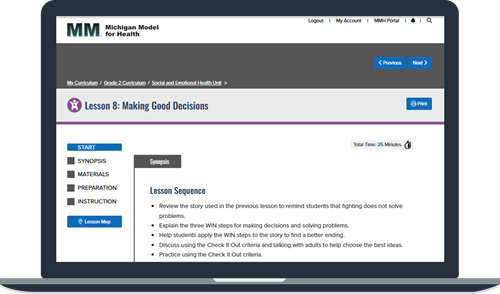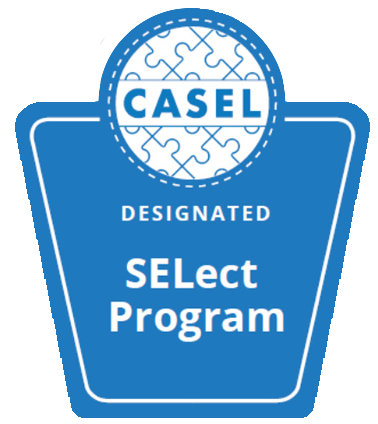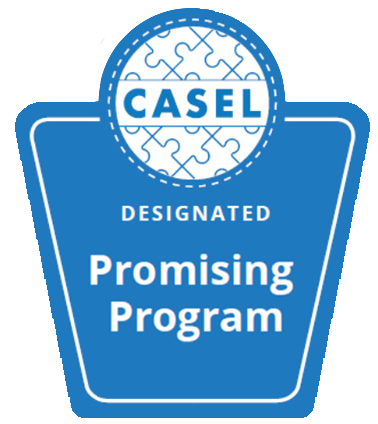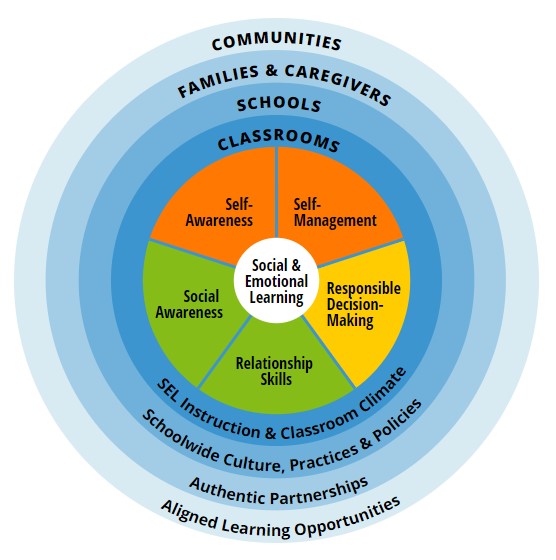Michigan Model + CASEL
The Michigan Model for Health™ (MMH) is a CASEL-certified, evidence-based curriculum designed to support students’ social, emotional, and overall well-being. Its lessons are easy to use, flexible, and adaptable for a variety of classroom settings, helping teachers confidently address health, wellness, and prevention topics. MMH equips students with knowledge and practical skills that encourage healthy decision-making, resilience, and positive choices throughout childhood and adolescence.

MMH Meets CASEL's Program Research Criteria

The Michigan Model for Health™ elementary curriculum is an approved CASEL SELect Program. The evaluation supported evidence of program effectiveness with the outcome of increased positive social behavior, reduced conduct problems, and substance misuse prevention.

The Michigan Model for Health™ middle school curriculum is an approved CASEL Promising Program. The evaluation supported program effectiveness and found that compared to students in the comparison group students who participated in the program reported lower frequencies of misusing drugs and alcohol at post-test.
Explore Our Curriculum
The Michigan Model for Health™ helps students build knowledge, skills, and healthy habits through flexible, ready-to-teach lessons across six core health subjects:
Improving Student Engagement through CASEL Competencies
The health standards, skills, and topics taught in Michigan Model for Health™ and the Social Emotional Learning (SEL) Competencies put forth by the Collaborative on Academic and Social Emotional Learning (CASEL) are tightly aligned. The five SEL competencies are foundational competencies students and adults need to achieve social and emotional learning mastery.

Collaborative for Academic, Social, and Emotional Learning (CASEL) Framework Wheel
- Self-Awareness - The ability to accurately recognize one’s own emotions, thoughts, and values and how they influence behavior. The ability to accurately assess one’s strengths and limitations, with a well-grounded sense of confidence, optimism, and a “growth mindset”.
- Self-Management - The ability to successfully regulate one’s emotions, thoughts, and behaviors in different situations – effectively managing stress, controlling impulses, and motivating oneself. The ability to set and work toward personal and academic goals.
- Social Awareness - The ability to take the perspective of and empathize with others, including those from diverse backgrounds and cultures. The ability to understand social and ethical norms for behavior and to recognize family, school, and community resources and supports.
- Relationship Skills - The ability to establish and maintain healthy and rewarding relationships with diverse individuals and groups. The ability to communicate clearly, listen well, cooperate with others, resist inappropriate social pressure, negotiate conflict constructively, and seek and offer help when needed.
- Responsible Decision-Making - The ability to make constructive choices about personal behavior and social interactions based on ethical standards, safety concerns, and social norms. The realistic evaluation of consequences of various actions, and a consideration of the well-being of oneself and others.
